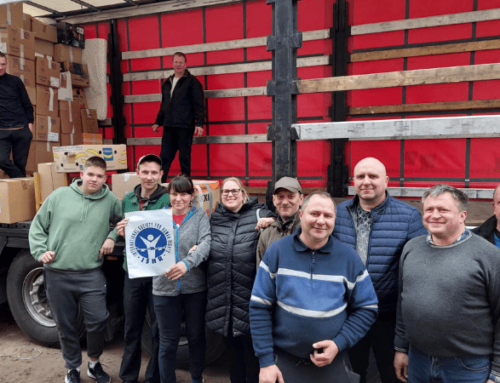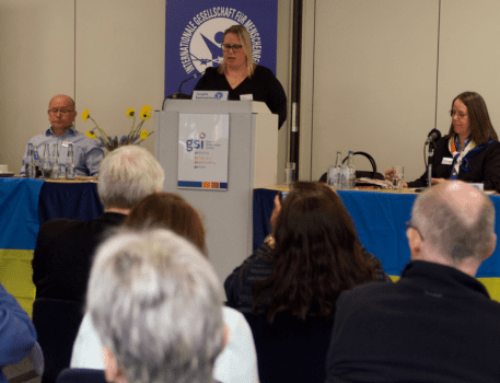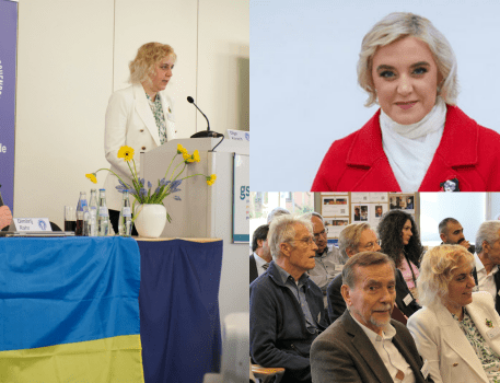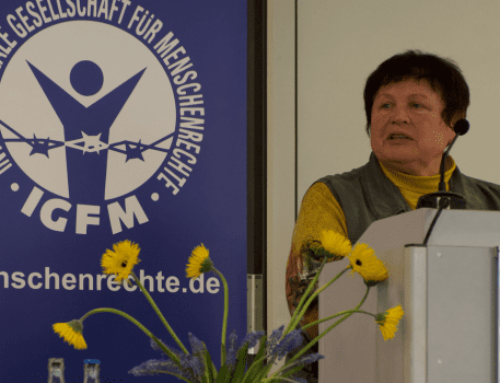Huge gap between appearance and being in Moldova
Some thoughts on the meeting of the President of the International Society for Human Rights with Moldovan human defenders and the situation in Moldova
President of the International Society for Human Rights, Professor Thomas Schirrmacher, visited the Republic of Moldova from May 4 to 6, 2019.
The purpose of the visit was to support Moldovan human rights activists, including the members of the Moldovan Section of the ISHR, as well as on-site study of the state of human rights in the Republic of Moldova, including the unrecognized Pridnestrovian Moldavian Republic (Transnistria ).
Note that Professor Schirrmacher is well-informed about the current political situation and the human rights activities of non-governmental organizations in the Eastern Partnership countries, including in Moldova. However, during the recent meeting, Moldovan activists completed the picture of the political situation by new details.
During the trip and all the meetings, Professor Thomas Schirrmacher was accompanied by his wife, Professor Christine Schirrmacher.

Photo 1. Cristine and Thomas Schirrmacher in Chisinau on May 6.
Christine Schirrmacher is a member of the Academic Advisory Board of the Federal Agency for Civic Education as well as a member of the Board of the German Institute for Human Rights. Both positions are on appointment of the German Federal Parlament (Deutsche Bundestag). Besides she several times worked as an expert for the Committee on Human Rights and Humanitarian Aid of the German Bundestag.
On May 5th, there was held a meeting of Prof. Thomas Schirrmacher with representatives of public organizations, business and lawyers in the city of Tiraspol, the capital of Transnistria. The meeting participants related about the current situation in which Transnistrian non-governmental organizations for human rights have to work; They learned about the functioning and structure of the International Society for Human Rights.
Within the discussion of socially significant processes, the participants of the meeting informed Prof. Schirrmacher about human rights observance issues in Transnistria and that some international organizations – involved in the analysis – don’t always objectively interpret the information they dispose of. Active representatives of the civil society in Transnistria know better the situation in the region, as they constantly face human rights violations and try to help various categories of the population: young people, prisoners, gypsies and people with disabilities.

Photo 2. Meeting with the activists of Transnistrian NGOs in Tiraspol on May 5, 2019.
The President of the ISHR noted that obtaining objective information from the people living in Transnistria is an important line of activity of international structures and international human rights organizations, including the ISHR. Therefore, the creation and work of a working group in Tiraspol would be very important and relevant for cooperation with the ISHR.
During the meeting, some questions on the interaction of the civil societies of the EU countries and the countries of the former Soviet Union with Transnistrian representatives of civil society and human rights activists were raised. There were discussions on cooperation options. The proposed cooperation options may include working with international experts to provide expert opinions in the field of human rights observance, situation analysis and preparation of information together with international human rights organizations on the state of affairs in Transnistria, participation in the events held by the ISHR.
Participants of the meeting came to the conclusion that it is necessary to teach the younger generation in schools, secondary and higher educational institutions human rights and promote the idea of human rights among the population and local authorities. It is necessary to implement in the region the World Plan of Action on Education for Human Rights with involvement of students, graduate students, representatives of civil society in this process.
Participants thanked Thomas and Christine Schirrmacher for providing opportunity to hold a meeting at such a high level and establish contacts for further cooperation and amelioration of the situation regarding human rights observance in Transnistria.
On May 6th, in Chisinau, there was held a meeting of Prof. Thomas Schirrmacher, President of the International Society for Human Rights (ISHR), with Moldovan human rights defenders, lawyers and journalists.

Photo 3. Meeting with Moldovan human rights defenders in Chisinau, on May 6th, 2019
In the course of the rich three-hour conversation, the whole complex of problems associated with regular violations of human rights in the Republic Moldova was discussed.
The meeting participants related the serious deterioration of the situation with respect to human rights. Statistical data from independent international organizations for human rights were reported. According to these data, Moldova is at the level of the poorest African countries in the field of human rights observance.
The dominant topic in the speeches of participants was the capture of the Moldovan State by the Democratic Party of Moldova (PDM) and, in particular, by oligarch Vladimir Plahotniuc.
The moderator of the meeting drew attention to how the process of actual usurpation of the state power in the country took place and told about the results of the present and previous parliamentary elections.
As a result of the previous parliamentary elections, in 2014, DPM received only 19 mandates, but by the end of the term of the previous parliament, the party of Plahotniuc had gained control over the majority of deputies. This majority became a springboard for the subsequent seizure of all state institutions in the country.
One of the participants of the meeting, the ex-deputy of the Parliament of Moldova, referred to a number of glaring facts that once again eloquently confirm the phenomenon of “captured state”. The Democratic Party, being managed by Plahotniuc, made a parliamentary majority at the time, shamelessly bribing and intimidating deputies from other political formations.
Local human rights activists have focused on long-term tendency to democracy diminution in the country, when so called “pro-European power”, loudly declaring democratic principles and values, in practice, consistently imposes in Moldova a tough authoritarian system. Today, the Moldovan oligarch, the chairman of the Democratic Party, Vladimir Plahotniuc has in fact become the sole ruler of the country. It got to the point that in modern Moldova Vladimir Plahotniuc can even cancel the results of local elections that don’t suit him.
As a result of the election of the mayor of Chisinau, Andrei Nastase, known as the most tough and irreconcilable opponent of the oligarch, became the winner on June 3, 2018. His victory inspired the opposition and gave the hope for the victory in the battle against criminal regime. But the joy of the opposition was short-lived.
On June 19, 2018, the Chisinau Court declared invalid the results of the election, allegedly due to the agitation on the day of the election. Subsequently, the Supreme Court and the Central Election Commission supported the Chisinau Court decision.
This was the precedent when the court decided on invalidity of the election on their own initiative, although there was no recourse to the court both from the competitor and from institutions controlling the election process. It is not clear how the court could assess the degree of influence of agitation upon the final result.
Politically motivated decision was opposed not only by Moldovan opposition but Western partners of the current Moldovan authorities as well. EU and USA criticized Moldovan authorities for canceling of the results of the Chisinau mayor election.
The participants of the meeting related with pain that selective justice and corruption are still the most serious problems encountered by the Moldovan citizens. The current power doesn’t refrain from applying outright repression against unwanted oppositionists.
The ruling party has found a punitive instrument in the form of the justice system. Just after Plahotniuc had actually usurped the power, imprisonment for political reasons became reality.
Moldova faced the phenomenon of political persecution, and specifically the mass of this phenomenon. Staging criminal cases as to the people that are unfavorable to the regime has become the norm. The state authorities in Moldova insult and discredit human rights activists and the activity thereof. Human rights activists are exposed to threats, intimidation and persecution even for criticizing the decisions of the authorities.
In this sense, one of the most famous cases was the “Petrenko Group”. Grigory Petrenko and six of his comrades were detained on September 6, 2015 during the protest at the General Prosecutor’s Office.
Despite the fact that earlier, in June 2015, Grigory Petrenko was assigned the title of “honorary member of the Parliamentary Assembly of the Council of Europe”, this didn’t stop the regime of Plahotniuc, and the charges were fabricated.
The release from prison was facilitated by the active position of the international community and especially the PACE. However, fair trial couldn’t be achieved: Grigory Petrenko and his group were convicted in 2017 to different terms. During the proceedings, the representatives of the Parliamentary Assembly of the Council of Europe, German Government and US Department of State recognized members of the “Petrenko Group” as political prisoners. According to the sentence, Petrenko was forbidden to leave Moldova, but he managed to leave Moldova in 2018 and obtain political asylum in Germany.
The arrest and the unfair trial scared many opponents of the regime.
Not only Petrenko was forced to flee the country, but many other people that are out of favour with the authorities, including representatives of civil society, human rights activists, lawyers and even judges were extruded from the country for political reasons.
Criminal prosecution on trumped-up charges may be initiated as to any unwanted person in the country. No lawyer is able to help, since there is no guarantee of fair trial.
“In a situation where the judicial system and the security forces are completely controlled by a small group of people, ordinary people in Moldova feel absolutely powerless and unprotected from the arbitrariness of the authorities” representatives of human rights organizations assert.
Speakers noted constant pressure on lawyers by the authorities.
Surveillance, psychological pressure and commencement of prosecution carried out by the authorities as to undesirable lawyers have become common practice. In Moldova, lawyer’s profession has become dangerous. These are lawyers who take up celebrated cases and go against the system. As a result of such pressure, some of them were forced to leave the country.
The meeting participants related many human rights violations in Moldova. Often another story turned from a statement of facts into a discussion.

Photo 4. Discussion on the topic of corruption and pressure on human rights activists
In the light of human rights issues, the President of the ISHR paid special attention to the need to fight corruption in the judicial system of Moldova, “A corrupt judge will never rightly judge another corruptionist… .” There is a clear link between corruption and pressure on human rights activists in Moldova.
At the end of the meeting, Thomas Schirrmacher highly appreciated the aspiration of the Moldovan human rights activists to give wide publicity to the facts of human rights violations in Moldova. He urged activists to coordinate efforts as much as possible inside the country and regularly report on violations in Moldova to European human rights institutions. He considers that there is “a huge abyss” between how Moldova represents itself abroad and how the human rights are observed in Moldova.
Meeting participants thanked Thomas and Christine Schirrmacher for their interest to the activities of Moldovan human rights organizations and for the understanding of difficult conditions of activities thereof.
The portraits drawn during the meeting have become a pleasant surprise for our guests.

Photo 5. Portraits to remember the meeting in Chisinau.
This meeting – which was very difficult to organize for many reasons – and speech at the meeting required a certain bold civil position and the courage of the Moldovan human rights defenders in the current reality of Moldova.
However, such meetings are very necessary. Especially nowadays, when there are more and more impersonal intermediaries (Internet, various mass media, etc.) between people, which move people away from each other and do not contribute to consolidation. New information technologies create more and more opportunities for disinformation of the population. In my opinion, we all need live communication, which Prof. Schirrmacher lays emphasis on. It improves human communication and promotes dialogue and interaction between human rights activists from different countries in order to ensure the observance of human rights and freedoms.

Photo 6. Search for a joint solution to actual problems
The high international prestige of Prof. Schirrmacher – the President of the ISHR -contributes to preserving the meaning of human rights activities, which is to protect people from the arbitrariness of the authorities and help the members of the ISHR to build and strengthen civil society in their countries.
Dr. Liubov Nemcinova
Chairman of the Moldovan Section of the ISHR








Leave A Comment